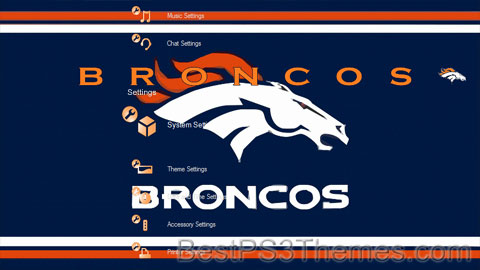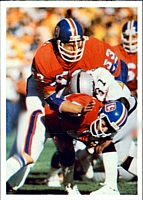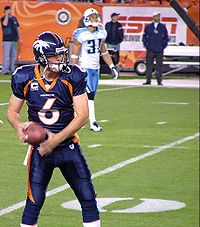Denver Broncos theme by NodgeDaFunk
Download: DenverBroncos_2.p3t

(3 backgrounds)
| Denver Broncos | |||||
|---|---|---|---|---|---|
| Established August 14, 1959[1][2] First season: 1960 Play in Empower Field at Mile High Denver, Colorado Headquartered at Centura Health Training Center in Dove Valley, Colorado[3][4] | |||||
| |||||
| League/conference affiliations | |||||
American Football League (1960–1969)
National Football League (1970–present)
| |||||
Current uniform | |||||
| Team colors | Sunset orange, midnight navy, summit white[5][6][7] | ||||
| Mascot | Thunder (live horse) Miles (costume suit) | ||||
| Website | denverbroncos.com | ||||
| Personnel | |||||
| Owner(s) | Rob Walton[a] | ||||
| CEO | Greg Penner | ||||
| President | Damani Leech | ||||
| General manager | George Paton | ||||
| Head coach | Sean Payton | ||||
| Team history | |||||
| |||||
| Team nicknames | |||||
| |||||
| Championships | |||||
| League championships (3) | |||||
| Conference championships (8) | |||||
| Division championships (15) | |||||
| Playoff appearances (22) | |||||
| Home fields | |||||
| |||||
| Team owner(s) | |||||
| |||||
The Denver Broncos are a professional American football franchise based in Denver. The Broncos compete in the National Football League (NFL) as a member club of the league's American Football Conference (AFC) West division. The team is headquartered in Dove Valley, Colorado.
The team began play in 1960 as a charter member of the American Football League (AFL) and joined the NFL as part of the merger in 1970. The Broncos are currently owned by the Walton-Penner group, and play their home games at Empower Field at Mile High since 2001; Denver previously played its home games at Mile High Stadium from its inception in 1960 through the 2000 season.
The Broncos were barely competitive during their 10-year run in the AFL and their first three years in the NFL. They did not have a winning season until 1973 and qualified for their first playoffs in 1977, eventually advancing to Super Bowl XII that season. Since 1975, the Broncos have become one of the NFL's most successful teams, having suffered only eleven losing seasons.[8] They have won eight AFC Championships (1977, 1986, 1987, 1989, 1997, 1998, 2013, 2015), and three Super Bowl championships (1997 (XXXII), 1998 (XXXIII), 2015 (50), and share the NFL record for most Super Bowl losses (5 – tied with the New England Patriots). The Broncos have nine primary members enshrined in the Pro Football Hall of Fame: John Elway, Floyd Little, Shannon Sharpe, Gary Zimmerman, Terrell Davis, Champ Bailey, Steve Atwater, and Randy Gradishar, along with late club owner Pat Bowlen.[9]
According to Forbes, the Broncos are valued at $4.65 billion in July 2022 making them the twelfth most-valuable team in the NFL.[10]
Franchise history[edit]
Bob Howsam/Gerald Phipps era (1960–1980)[edit]
The Denver Broncos were founded on August 14, 1959, when minor league baseball owner Bob Howsam was awarded an American Football League (AFL) charter franchise.[2] The Broncos won the first-ever AFL game over the Boston Patriots 13–10, on September 9, 1960. Seven years later on August 5, 1967, they became the first-ever AFL team to defeat an NFL team, with a 13–7 win over the Detroit Lions in a preseason game.[2] However, the Broncos were not successful in the 1960s, winning more than five games only once (7–7, 1962), compiling a 39–97–4 (.293) record during the ten seasons of the AFL.[11]
Denver came close to losing its franchise in 1965, until a local ownership group took control,[12][13] and rebuilt the team.[14] The team's first superstar, "Franchise" Floyd Little, was instrumental in keeping the team in Denver, due to his signing in 1967 as well as his Pro Bowl efforts on and off the field. The Broncos were the only original AFL team that never played in the title game, as well as the only original AFL team never to have a winning season while a member of the AFL during the upstart league's 10-year history.[15]
In 1972, the Broncos hired former Stanford University coach John Ralston as their head coach. In 1973, he was the UPI's AFC Coach of the Year, after Denver achieved its first winning season at 7–5–2. In five seasons with the Broncos, Ralston guided the team to three winning seasons. Though Ralston finished the 1976 season with a 9–5 record, the team, as was the case in Ralston's previous winning seasons, still missed the playoffs. Following the season, several prominent players publicly voiced their discontent with Ralston, which soon led to his resignation.[16]

Red Miller, a long-time assistant coach, was hired and along with the Orange Crush Defense (a nickname originated in 1977, also the brand of the popular orange-flavored soft drink) and aging quarterback Craig Morton, took the Broncos to what was then a record-setting 12–2 regular-season record and their first playoff appearance in 1977, and ultimately made their first Super Bowl appearance in Super Bowl XII, in which they were defeated by the Dallas Cowboys (Morton's former team), 27–10.[17]
Edgar Kaiser/Pat Bowlen era (1981–2018)[edit]
In 1981, Broncos' owner Gerald Phipps, who had purchased the team in May 1961 from the original owner Bob Howsam, sold the team to Canadian financier Edgar Kaiser Jr., grandson of shipbuilding industrialist Henry J. Kaiser.[18] In 1984, the team was purchased by another Canadian, Pat Bowlen, who placed team ownership into a family trust sometime before 2004 and remained in day-to-day control until his battle with Alzheimer's disease forced him to cede the team to Joe Ellis in 2014.[19][20][21]
Dan Reeves years (1981–1992)[edit]
Dan Reeves became the youngest head coach (37) in the NFL when he joined the Broncos in 1981 as vice president and head coach. Quarterback John Elway, who played college football at Stanford, arrived in 1983 via a trade. Originally drafted by the Baltimore Colts as the first pick of the draft, Elway proclaimed that he would shun football in favor of baseball (he was drafted by the New York Yankees to play center field and was also a pitching prospect), unless he was traded to a selected list of other teams, which included the Broncos.[22] Prior to Elway, the Broncos had over 24 different starting quarterbacks in its 23 seasons to that point.[23]


Reeves and Elway guided the Broncos to six post-season appearances, five AFC West divisional titles, three AFC championships and three Super Bowl appearances (Super Bowl XXI, XXII and XXIV) during their 12-year span together. The Broncos lost Super Bowl XXI to the New York Giants, 39–20; Super Bowl XXII to the Washington Redskins, 42–10; and Super Bowl XXIV to the San Francisco 49ers, 55–10; the latter score remains the most lopsided scoring differential in Super Bowl history. The last year of the Reeves-Elway era were marked by feuding, due to Reeves taking on play-calling duties after ousting Elway's favorite offensive coordinator Mike Shanahan after the 1991 season, as well as Reeves drafting quarterback Tommy Maddox out of UCLA instead of going with a wide receiver to help Elway. Reeves was fired after the 1992 season and replaced by his protégé and friend Wade Phillips, who had been serving as the Broncos' defensive coordinator.[24][25][26] Phillips was fired after a mediocre 1994 season, in which management felt he lost control of the team.
Mike Shanahan years (1995–2008)[edit]
In 1995, Mike Shanahan, who had formerly served under Reeves as the Broncos' offensive coordinator, returned as head coach. Shanahan drafted rookie running back Terrell Davis. In 1996, the Broncos were the top seed in the AFC with a 13–3 record, dominating most of the teams that year. The fifth-seeded Jacksonville Jaguars, however, upset the Broncos 30–27 in the divisional round of the playoffs, ending the Broncos' 1996 run.[16]
Super Bowl XXXII champions (1997)[edit]
During the 1997 season, Elway and Davis helped guide the Broncos to their first Super Bowl victory, a 31–24 win over the defending champion Green Bay Packers in Super Bowl XXXII. Though Elway completed only 13 of 22 passes, throwing one interception and no touchdowns (he did, however, have a rushing touchdown), Davis rushed for 157 yards and a Super Bowl-record three touchdowns to earn the Super Bowl Most Valuable Player Award—this while overcoming a severe migraine headache that caused him blurred vision.[27]
Super Bowl XXXIII champions (1998)[edit]
The Broncos repeated as Super Bowl champions the following season, defeating the Atlanta Falcons (led by Elway's longtime head coach Dan Reeves) in Super Bowl XXXIII, 34–19. Elway was named Super Bowl MVP, completing 18 of 29 passes for 336 yards, with an 80-yard touchdown to wide receiver Rod Smith and one interception.[26]

John Elway retired following the 1998 season, and Brian Griese started at quarterback for the next four seasons. After a 6–10 record in 1999, mostly due to a season-ending injury to Terrell Davis, the Broncos recovered in 2000, earning a Wild Card playoff berth, but losing to the eventual Super Bowl champion Baltimore Ravens. After missing the playoffs the following two seasons, former Arizona Cardinals' quarterback Jake Plummer replaced Griese in 2003, and led the Broncos to two straight 10–6 seasons, earning Wild Card playoff berths both years. However, the Broncos went on the road to face the Indianapolis Colts in back-to-back seasons and were blown out by more than 20 points in each game, allowing a combined 90 points.[16]
In the years following the back-to-back championships, a league investigation revealed that the team had cheated the salary cap in both seasons and the 1996 season by deferring additional money to Elway and Davis outside of the salary cap. In addition, they purposefully avoided waiving certain players before a certain date. Denver claimed the moves did not give them additional competitive advantage. Between two separate punishments, they were stripped of their third-round picks in both the 2002 and 2005 drafts and fined nearly $2 million combined.[28][29]
Plummer led the Broncos to a 13–3 record in 2005 and their first AFC West division title since 1998. After a first-round bye, the Broncos defeated the defending Super Bowl champion New England Patriots, 27–13, denying New England from becoming the first NFL team ever to win three consecutive Super Bowl championships. They were the first team to beat the Patriots in the playoffs during the Tom Brady era. The Broncos' playoff run came to an end the next week, after losing at home to the Pittsburgh Steelers in the AFC Championship game, 34–17. The Steelers went on to win Super Bowl XL.
The Broncos' defense began the first five games of the 2006 season allowing only one touchdown — an NFL record that still stands. ESPN commentator and Super Bowl-winning quarterback Joe Theismann gave the 2006 defense the name "Bad Blue" on Monday Night Football as they played the Ravens. However, the team struggled down the season stretch. Plummer led the team to a 7–2 record, but struggled individually with inconsistent performance and more interceptions than touchdown passes. As a result, he would be replaced by rookie quarterback Jay Cutler. Cutler went 2–3 as a starter, and the Broncos finished with a 9–7 record, losing the tiebreaker to the Kansas City Chiefs for the final playoff spot. Cutler's first full season as a starter in 2007 became the Broncos' first losing season since 1999, with a 7–9 record.
The 2008 season ended in a 52–21 loss at the San Diego Chargers, giving the Broncos an 8–8 record and their third straight season out of the playoffs. Mike Shanahan, the longest-tenured and most successful head coach in Broncos' franchise history, was fired after 14 seasons.[30]
Josh McDaniels years (2009–2010)[edit]
On January 11, 2009, two weeks after Shanahan was fired, the Broncos hired former New England Patriots' offensive coordinator Josh McDaniels as the team's new head coach.[31] Three months later, the team acquired quarterback Kyle Orton as part of a trade that sent Jay Cutler to the Chicago Bears.
Under McDaniels and Orton, the Broncos jumped out to a surprising 6–0 start in 2009. However, the team lost eight of their next ten games, finishing 8–8 for a second consecutive season and missing the playoffs. The next season (2010), the Broncos set a new franchise record for losses in a single season, with a 4–12 record.[32] McDaniels was fired before the end of the 2010 season following a combination of the team's poor record and the fallout from a highly publicized videotaping scandal. Running backs coach Eric Studesville was named interim coach for the final four games of the 2010 season.[33] He chose to start rookie first-round draft choice Tim Tebow at quarterback for the final three games.
John Fox years (2011–2014)[edit]
Following the 2010 season, Joe Ellis was promoted from chief operating officer to team president, while John Elway returned to the organization as the team's executive vice president of football operations.[34] In addition, the Broncos hired John Fox as the team's 14th head coach. Fox previously served as the Carolina Panthers' head coach from 2002 to 2010.[35]
Following a 1–4 start to the 2011 season, Tim Tebow replaced Kyle Orton as the Broncos' starting quarterback, and "Tebow Time" was born. Tebow led the Broncos with toughness, determination and miraculous come-from-behind victories which gave the Broncos hope and were the catalyst for better things to come. Tebow led the Broncos to an 8–8 record and garnered the team's first playoff berth and division title since 2005. The Broncos defeated the Pittsburgh Steelers in the Wild Card round on a memorable 80-yard touchdown pass from Tebow to wide receiver Demaryius Thomas on the first play of overtime, setting a record for the fastest overtime in



